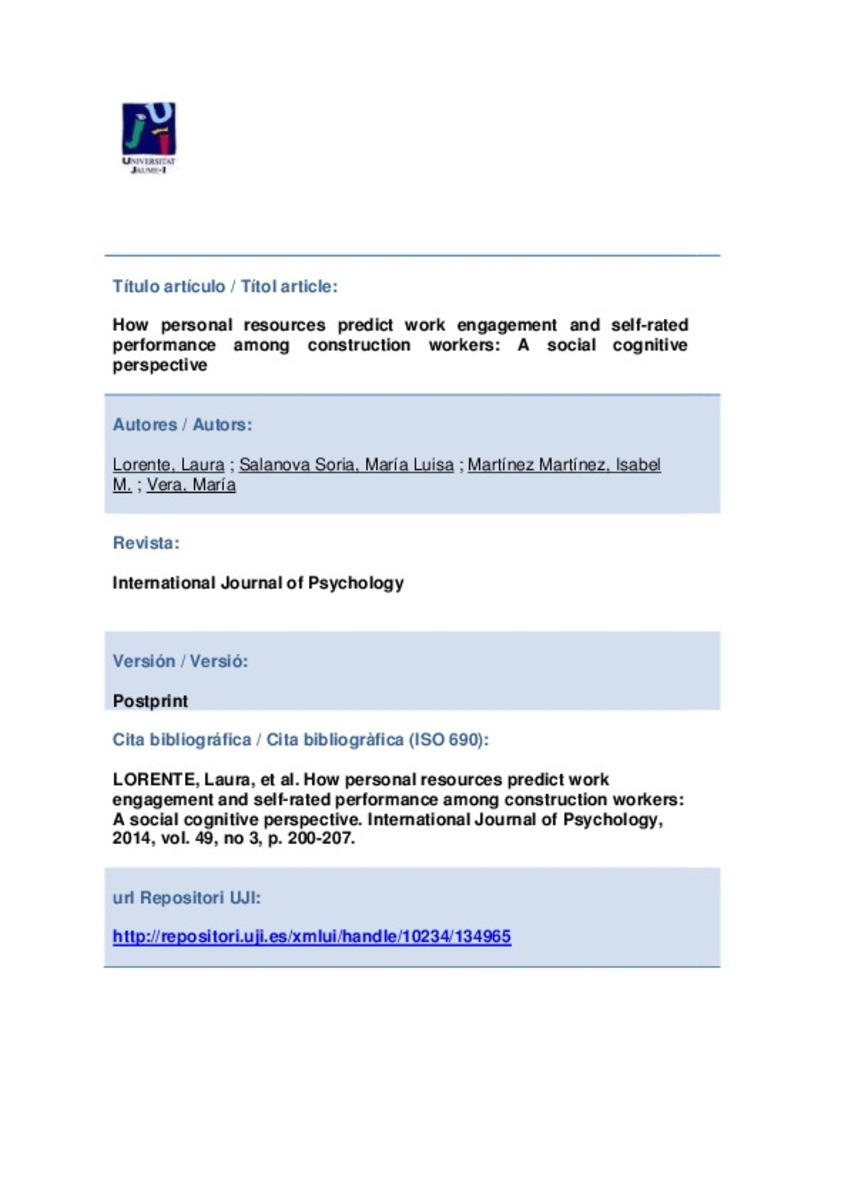Mostrar el registro sencillo del ítem
How personal resources predict work engagement and self-rated performance among construction workers: A social cognitive perspective
| dc.contributor.author | Lorente Prieto, Laura | |
| dc.contributor.author | Salanova, Marisa | |
| dc.contributor.author | Martinez, Isabel M. | |
| dc.contributor.author | Vera Perea, María | |
| dc.date.accessioned | 2015-10-02T14:15:54Z | |
| dc.date.available | 2015-10-02T14:15:54Z | |
| dc.date.issued | 2014-03 | |
| dc.identifier.citation | LORENTE, Laura, et al. How personal resources predict work engagement and self‐rated performance among construction workers: A social cognitive perspective. International Journal of Psychology, 2014, vol. 49, no 3, p. 200-207. | ca_CA |
| dc.identifier.uri | http://hdl.handle.net/10234/134965 | |
| dc.description.abstract | Traditionally, research focussing on psychosocial factors in the construction industry has focused mainly on the negative aspects of health and on results such as occupational accidents. This study, however, focuses on the specific relationships among the different positive psychosocial factors shared by construction workers that could be responsible for occupational well-being and outcomes such as performance. The main objective of this study was to test whether personal resources predict self-rated job performance through job resources and work engagement. Following the predictions of Bandura's Social Cognitive Theory and the motivational process of the Job Demands-Resources Model, we expect that the relationship between personal resources and performance will be fully mediated by job resources and work engagement. The sample consists of 228 construction workers. Structural equation modelling supports the research model. Personal resources (i.e. self-efficacy, mental and emotional competences) play a predicting role in the perception of job resources (i.e. job control and supervisor social support), which in turn leads to work engagement and self-rated performance. This study emphasises the crucial role that personal resources play in determining how people perceive job resources by determining the levels of work engagement and, hence, their self-rated job performance. Theoretical and practical implications are discussed. | ca_CA |
| dc.format.extent | 24 p. | ca_CA |
| dc.format.mimetype | application/pdf | ca_CA |
| dc.language.iso | eng | ca_CA |
| dc.publisher | Taylor & Francis (Routledge) | ca_CA |
| dc.relation.isPartOf | International Journal of Psychology, 2014, vol. 49, no 3 | ca_CA |
| dc.rights | CC0 1.0 Universal | * |
| dc.rights.uri | http://creativecommons.org/publicdomain/zero/1.0/ | * |
| dc.subject | Personal and job resources | ca_CA |
| dc.subject | Work engagement | ca_CA |
| dc.subject | Self-rated performance | ca_CA |
| dc.title | How personal resources predict work engagement and self-rated performance among construction workers: A social cognitive perspective | ca_CA |
| dc.type | info:eu-repo/semantics/article | ca_CA |
| dc.identifier.doi | http:\\dx.doi.org/10.1002/ijop.12049 | |
| dc.rights.accessRights | info:eu-repo/semantics/openAccess | ca_CA |
| dc.edition | Postprint | ca_CA |
| dc.type.version | info:eu-repo/semantics/publishedVersion | ca_CA |
Ficheros en el ítem
Este ítem aparece en la(s) siguiente(s) colección(ones)
-
PSI_Articles [592]
Articles de publicacions periòdiques








